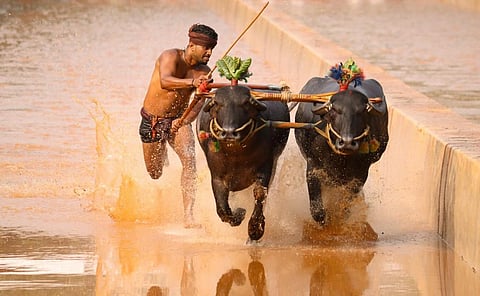

A five-judge bench of the Supreme Court on May 18, 2023, upheld the constitutional validity of amendments made to the Prevention of Cruelty To Animals Act by Tamil Nadu, Karnataka and Maharashtra to allow cultural events such as Jallikattu, Kambala and bullock-cart racing.
The bench, including justices Ajay Rastogi, Aniruddha Bose, Hrishikesh Roy and CT Ravikumar, and led by Justice K M Joseph, dismissed a batch of petitions filed by animal rights groups challenging the amendments’ constitutionality, legal website LiveLaw reported.
The amendments had been passed by the state governments after the apex court had banned Jallikattu and similar activities in 2014 in the case Animal Welfare Board of India vs A Nagaraja & Ors.
The bench held that these amendments were not a “colourable piece of legislation”. The state legislature had the legislative power to make these amendments in accordance with Entry 17 to List III of the Seventh Schedule of the Indian Constitution.
It added that the laws provided enough safeguards against the infliction of cruelty to animals and punishments. Since these amended laws had received presidential assent, they could not be faulted.
Read Down To Earth’s coverage of Jallikattu
“We are of the opinion that the defects pointed out in the 2014 judgment have been overcome by the State Amendment Act read with the rules made therein,” said the court, adding the rules provide adequate safeguards against inflicting cruelty to the animals and also prescribe punishments for breaching of norms.
The court also directed that authorities must ensure strict compliance with the laws to protect animals from physical and mental trauma.
It refrained from saying whether Jallikattu was a part of cultural heritage under Article 29 of the Indian Constitution and deserved protection.
“Whether the Tamil Nadu amendment act is to preserve the cultural heritage of a particular state is a debatable issue which has to be concluded in the House of the people. These are not to be a part of judicial inquiry,” said the bench.
The judgement has been hailed across Tamil Nadu. The state’s Chief Minister, MK Stalin, tweeted:
The verdict delivered by the Supreme Court bench that there is no ban on holding jallikattu, a sport reflecting Tamils’ bravery and culture is worth engraving in gold in the history of Tamil Nadu.
“We are extremely pleased with the judgement of the apex court. The court has considered the merits of the case and has accepted that Jallikattu or Eru Thazhuvuthal is an ancient tradition of the Tamil people. The chief minister took a personal interest in the proceedings. The final judgement will hopefully put to rest the allegations of those who want it to be stopped,” KS Sivasenapathy, the head of the Dravida Munnetra Kazhagam’s environmental wing told Down To Earth.
Animal rights group, People for the Ethical Treatment of Animals, however said the judgement had “thrown India into the dark ages”.
“Gladiator games involving animals were ended by around 7th century Common Era, and countries around the world are prohibiting animal circuses and other cruel events. Yet in 2023, the Indian Supreme Court has allowed sensitive bulls to endure terror, beatings, broken bones, and bloody wounds in jallikattu and bull racing events, throwing the country into the Dark Ages,” PETA India Deputy Director of Advocacy Projects Harshil Maheshwari, said in a statement.
“PETA India is calling on everyone to steer clear of shameful spectacles that exploit bulls and buffaloes as we explore legal remedies to protect these long-suffering animals,” Maheshwari added.